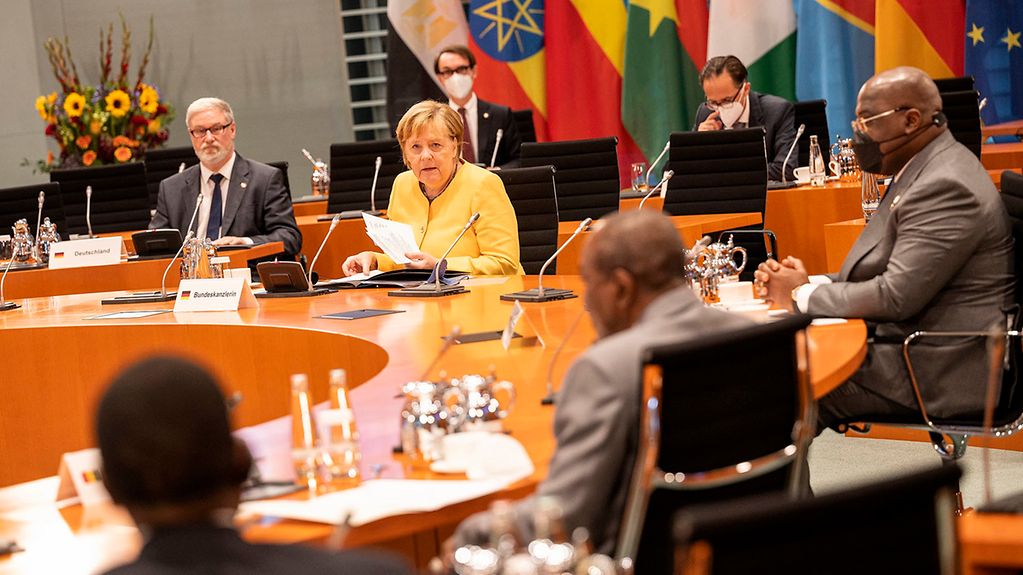Compact with Africa conference
The question of how to get the coronavirus vaccines to the people of Africa quickly was one of the main issues under discussion at the Compact with Africa conference. Federal Chancellor Merkel promised that Germany would be donating even more vaccine doses. A summary.
3 min reading time

Partnership consultations: some of the conference participants followed the meeting at the Federal Chancellery – numerous other heads of state and government attended via video link.
Photo: Federal Government/Bergmann
It was the fourth conference on the Compact with Africa – the G20 initiative to establish reform partnerships with African countries. A key issue this year was the supply of coronavirus vaccines to the African continent. In a press statement on Friday evening, Federal Chancellor Angela Merkel stressed that Africa's economies had been hit hard by the pandemic. “Vaccine availability and production are directly linked to the economic well-being of the African continent,” said Merkel.
The fact that just two percent of people in Africa had received a coronavirus vaccination to date was a “dramatic injustice that we must address swiftly”, she added, noting that the issue had been discussed very honestly at the Compact conference. “As as result, I think we’ll see opportunities to produce the vaccine in African countries, too,” she said.
Merkel announced that Germany would be able to donate 70 million vaccine doses to the Covax initiative this year rather than the planned 30 million doses. Covax is dedicated to global vaccine solidarity. “We now have to ensure the vaccine gets to the people of Africa quickly,” said Merkel.
The Compact with Africa initiative is a partnership on an equal footing. Launched in 2017 under the German G20 Presidency, it is the core element of a new approach to cooperation with Africa. The aim is to improve the conditions for private investment and employment opportunities in Africa in collaboration with the African partner countries.
The Compact links each African participant with a partner country from the G20 as well as international organisations such as the World Bank, the International Monetary Fund and the African Development Bank. These collaborative ventures are not based on standardised, blanket solutions: partners work together to develop reform programmes and support measures that are tailored to each individual country. The main aim is to increase private investment.
Economic conference on the sidelines of the Compact meeting
The preceding economic conference brought together high-ranking representatives from politics and business in order to identify prospects for improved German-African cooperation. Private sector investment is immensely important to advancing the economic development of the African continent.
In her conference speech, Federal Chancellor Merkel praised Africa as a “continent of opportunities and ideas”. The Compact with Africa was giving rise to new opportunities for cooperation and there were initial indications of success, she said, adding that the task now was to do more to lower barriers to trade and investment. “Africa has so much market potential that we need to tap into more effectively,” said Merkel. One example here was increased investment in renewable energy sources, she said: “Expansion in this area will be of enormous importance if we are to actually achieve our global climate goals,” said the Federal Chancellor.
The Compact with Africa has proven effective
The Compact with Africa has proven effective during the pandemic: the monitoring report published by the World Bank Group (in cooperation with the African Development Bank and the International Monetary Fund) shows that Compact countries were more resilient in the face of the coronavirus.
For 2021, the international organisations expect economic growth of 4.6 percent in the Compact countries of sub-Saharan Africa (as compared to 3.4 percent for sub-Saharan Africa as a whole) and 3.6 percent for the Compact countries in North Africa.